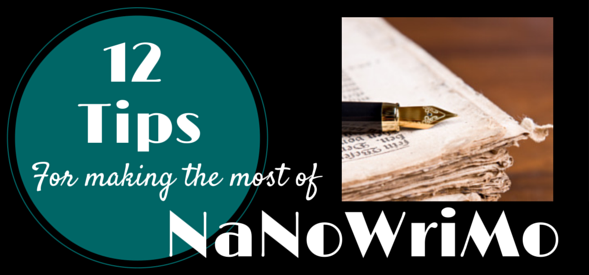
by Jenna | Oct 18, 2014 | Writing Articles
Will you take the NaNo plunge?
In many ways the purpose of NaNo is the same as the writing community's purpose — it’s about making the writing happen. The main difference I see is that in my writing community we focus on writing year round, in a sustainable way. With NaNo, the focus is on writing intensely for a shorter duration of time. Both approaches have pros and cons.
If you're on the fence about doing NaNo, here are some things to consider:
Advantages
- It's inspiring to write alongside other writers, especially with the same goal.
- ... and there’s a very clear focused goal: 50,000 words in 30 days.
- It helps keep you focused on one specific project instead of hopping from project to project and losing your way.
- Meeting a big goal in short amount of time can feel amazing and inspiring.
- It’s a great way to make a concerted push on a big project.
- When you write fast, you bypass your logical left brain and your inner critic. The results can be magical.
- It IS possible to write fast and write well.
Challenges
- Writing 1,667 words every day can be a lot for some writers.
- Not meeting the daily goal increases the number of unwritten words as each day ticks past, which then creates pressure to catch up.
- Writing every day at an intense pace can lead to creative burnout and writing aversion after the big push. Some writers report writing hard during NaNoWriMo and not writing for the rest of the year.
- Not meeting the goal might feel discouraging.
- Writers sometimes report generating a ton of words, but that the quality feels lacking.
12 tips for making the most of NaNoWriMo
If you do decide to go for it — and I hold no judgment either way, in writing it's all about what works for YOU — here are some ideas that might help you along the way.
Before NaNo
- Design your month around the effort. This could look like cutting back on extra activities, getting extra childcare, taking some time off work, etc. Really think about how you can make it EASY to meet this big goal.
- Be crystal clear about when you’re scheduling your writing time so there’s no doubt about when you’ll do it. Get out your calendar for the entire month and map out when you'll be spending the 1.5 to 2 hours you'll likely need each day.
- If you’re not a “panster”, work on your outline for your project NOW so you can start writing when the clock starts ticking. Even if you just map out the major story beats, you'll have something to swim toward when you're out there in the ocean of words you're about to dive into.
- Up-level your self-care and creative well-filling. Healthy food, lots of water, time in the sunshine, exercise, and lots of great creative inputs will help keep you humming at an optimal level throughout the month. (And keep this up DURING NaNo too.)
- Get lots of non-writing support for the rest of your life like bill-paying, grocery delivery, etc., or work on getting things in order now so you don't have to be distracted by them while you're neck deep in writing.
During NaNo
- Use timed writing sprints to help you write briskly for your daily writing goals. It has the added benefit of teaching you how long it takes you to write a certain number of words as well, so you'll know if you need to adjust how much time you're setting aside for scheduled writing time in #2, above. Plus you can use the sprints to break up the longer chunks of writing so that you get up and stretch between sessions. In my writing community we usually write in 60 minute sprints, but a good sprint can range in length from 15 to 90 minutes. Find what works best for you.
- Be mindful about your self-talk and keeping it as encouraging and self-supportive as possible. Notice any negative self-messages that come up and find a way to reframe them into a more positive perspective.
- Pay attention to how it’s feeling and working for you. There are no rights or wrongs here, no failures. You may want to experiment with challenging your own comfort zone or you may find that this is a method that doesn't work for you. It's ALL useful information that will only help you going forward.
- Have a support system outside NaNo like a writing group, community, or buddy to cheer you on and help keep things in perspective. If you're struggling, get help and support. You don't have to do this alone.
After NaNo
- Celebrate! When the end of NaNo rolls around, one way or another, celebrate. If you met the goal, great! Celebrate it. If you didn't meet the goal, make sure to celebrate the attempt.
- Rest! Once you're done, take one to two days off after NaNo and really enjoy it.
- Write! Then, start writing again. Make a plan for how you’ll keep writing after NaNo. This could look like keeping up the same pace if it worked for you or adjusting it up or down to find your new happy medium of accomplishment, sustainability, and attainability. You may find that you want an extra easy writing goal for the first week after the big NaNo push, which you can then reassess and adjust as needed.
You may also be interested in:
by Jenna | Sep 17, 2014 | Writing Articles
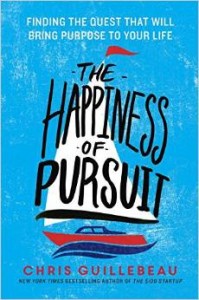 This week I'm reading Chris Guillebeau's freshly published book: The Happiness of Pursuit: Finding the Quest that Will Bring Purpose to Your Life.
This week I'm reading Chris Guillebeau's freshly published book: The Happiness of Pursuit: Finding the Quest that Will Bring Purpose to Your Life.
I've been a longtime follower of Chris's blog, The Art of Non-Conformity.
What I love about Chris's approach to Life, the Universe, and Everything is his go-get-it attitude about the things that matter to him. He's designed a life and completed a quest that works for him and his personality. This new book is about his quest to visit all the countries in the world by the time he was 35, and about the many people he met along the way that were pursuing quests of their own.
In talking with others and looking at his own experience, Chris gleaned a number of useful lessons and insights about creating and pursuing quests.
And although the focus of the book is generally on more external pursuits, I can't help thinking there's are great lessons to be learned for our writing lives as well. There are certainly some useful parallels to draw between quests and writing, as you'll see below.
Let's talk about some of the lessons that have stood out to me so far in what I'm reading:
1. "When you sense discontent, pay attention." Discontent is a powerful informant about what's not working in your life . . . but it's not enough on its own to spark a quest or change. Chris says, "If you want to get the embers burning, you have to blend dissatisfaction with inspiration, and then you have to connect the dissatisfaction to a greater purpose."
This is his equation for transmuting dissatisfaction:
Dissatisfaction + Big Idea + Willingness to Take Action = New Adventure
I've definitely found discontent to be a great source of information in my own life about what's not working and what I'd like to change, but it was my willingness to do something about it that really made the difference, particularly in my major career shift from urban design to coaching and ultimately to writing.
2. "A true calling involves trade-offs." A dream that calls you -- whether it's creating something or traveling the world -- will require a deeper investment or even sacrifice -- but it will feel worth it to you because you're called to do it.
Making the time to write often involves a sacrifice or trade off for me, but almost always feels worth it. And I'm certainly willing to make hard choices about fulfilling other dreams of mine in order to make them happen (from staying home with the kids to traveling the world).
3. Refuse to give your fear decision-making authority. Making headway into new territory will trigger fear. As Chris says, "Embracing new things often requires us to embrace our fears, however trivial they may seem. You deal with fear not by pretending it doesn't exist, but by refusing to give it decision-making authority."
Any big dream will trigger fear -- and Chris is absolutely right that we cannot allow it to dictate our decisions.
4. Have an emotional awareness of mortality. Chris differentiates between an intellectual awareness of mortality versus an emotional one.
Here's how he breaks it down:
- Intellectual awareness: "I know that no one lives forever."
- Emotional awareness: "I know that I will someday die."
I've always been vaguely annoyed by the notion to "live each day as if it's your last", because I'm pretty sure I wouldn't be emptying the dishwasher if it was my last day on Earth. But Chris's notion here, of having an emotional awareness, points to something more meaningful for me.
It's about having a sense of personal motivation to make the most of the time we are individually given, by adopting greater goals and pursuits that bring a sense of meaning and fulfillment into our lives. That version works for me.
5. Make your personal passions your quest. A quest, as Chris defines it, includes a clear goal, a real challenge, and set of milestones along the way, and something that involves some kind of investment or sacrifice. He doesn't include writing a book as a quest, though he defines that as a "general life improvement" along with other things like getting out of debt, getting in shape, quitting smoking. Those, he says, are not necessarily true quests.
The examples of quests given in the book range from his own (traveling to all the world's countries), a woman's goal of making a meal from every country for her family, a teen earning every Boy Scout merit badge, and a man using walking as an only means of transportation for 17 years (and not speaking either for that length of time as well).
More to come...
The rest of the book contains what looks like more delightful examples of other people's quests, along with some in depth chapters I'm particularly looking forward to reading.
There's one called "The Love of the Craft", which I think will be right up my alley, with some writing examples, including Seth Godin.
Can writing be a quest?
It occurs to me that writing could still be a quest by Chris's definition -- perhaps by setting a goal of some kind around it, like a certain number of books or screenplays written by a certain date, or like Seth Godin, writing 365 days per year. What do you think? Take a look below for an opportunity to submit your answer about how writing might look like a quest for you . . . and get a chance to win a copy of Chris's book!
About Chris
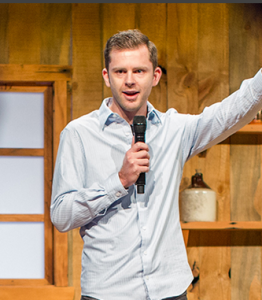 During a lifetime of self-employment that included a four-year commitment as a volunteer executive in West Africa, Chris visited every country in the world (193 in total) before his 35th birthday. Since then he has modeled the proven definition of an entrepreneur: “Someone who will work 24 hours a day for themselves to avoid working one hour a day for someone else.”
During a lifetime of self-employment that included a four-year commitment as a volunteer executive in West Africa, Chris visited every country in the world (193 in total) before his 35th birthday. Since then he has modeled the proven definition of an entrepreneur: “Someone who will work 24 hours a day for themselves to avoid working one hour a day for someone else.”
Chris’s first book, The Art of Non-Conformity, was translated into more than twenty languages. His second book, The $100 Startup, was a New York Times and Wall Street Journal bestseller, selling more than 300,000 copies worldwide. His latest book, The Happiness of Pursuit, will be published by Crown / Random House in September 2014.
Every summer in Portland, Oregon, Chris hosts the World Domination Summit, a gathering of creative, remarkable people with thousands in attendance. Chris is also the founder of Pioneer Nation, Unconventional Guides, the Travel Hacking Cartel, and numerous other projects.
Read Chris's favorite writing tips here: http://chrisguillebeau.com/good-writing-tips
Meet Chris
You can meet Chris on his tour of 40+ cities in North America. Find out more here: http://chrisguillebeau.com/events
Win a Copy of The Happiness of Pursuit
Pick up your own copy of The Happiness of Pursuit, on Amazon *, Barnes & Noble, and indie bookstores in hardback, paperback, or ebook form.
Thanks for reading!
* Affiliate link

by Jenna | Sep 10, 2014 | Writing Articles
Ugh. Procrastination.
We're all familiar with that simultaneous desire to write and the repulsion from writing that leads us into the nether realm of procrastination. We're doing something else -- ANYTHING else -- and it can range from feeling like we're doing something vitally important to just plain old digging our heels in and resisting.
Sometimes we tell ourselves we need to "warm up" first before we can write, with a little email, Facebook, or even a treat of some kind.
Or we decide we simply cannot tolerate the state of our physical space for a single minute longer -- how many offices, bathrooms, and kitchens have seen the plus side of procrastination on a day when writing feels oh-so-hard to do?
Other things come up too, right? All those urgent deadlines, other people's problems, our kids' needs, that bit of online research you just can't wait to do (you know, that one that snowballs into two hours of online nothingness -- and yes, I speak from experience), or even bigger things, like that college degree you suddenly have to have.
Understanding procrastination
There are a few of key things to understand about procrastination:
1. It's (usually) driven by fear. There's some kind of fear coming up that's stopping you from writing. You may not be clear on what it is, but trust me, it's there. Fears of success, failure, commitment, overwhelm, rejection, praise, inability to deliver, etc. are most likely to come up. (When it's not fear-driven, there's usually something significant going on, like healing from a traumatic creative wound or recovering from creative burnout, but I would call that a block, a subject for a future post.)
2. Not taking action on your writing will keep you in a low grade state of anxiety, guilt, and shame. I say "low" but it can skyrocket into a full-on painful squirming-in-shame. So even if you're pretending you are just watching your favorite TV show for a little treat before you get started and that it will help you relax into writing -- check in with yourself -- are you really, truly, in your heart-of-heart's feeling relaxed? Or are you twitching with unrest and discomfort inside?
3. It's a lot easier to fix than you think it is. There are some days when it simply isn't possible to sit down and power through tons of writing. That's okay. There are days when you can't face your draft. That's okay. But you CAN write, even if it's just for a few minutes.
And ultimately, making small moves will help you beat procrastination in the big picture.
Beating procrastination
Here are seven ways you can beat procrastination and get back in the writing saddle:
1. Have a short but honest talk with yourself about what's really going on. This doesn't have to be a big deal. But it's worth acknowledging in the privacy of your own mind, "Yes, I'm procrastinating, and it feels crummy. I'm going to do something about it."
2. Tell someone what you're doing. Find an accountability partner, a writing buddy, or a writing group that will help you commit to doing the writing and seeing it through. It helps tremendously to say to another person (even if it's your spouse or best friend!), "I'm going to write today no matter what."
3. Make a deal with yourself to write ANYTHING for 15 minutes. I don't care if you write morning pages, a list of all the reasons you hate writing, or actually work on your current writing project. Just get out a piece of paper or open your Scrivener file or Word document (I'm a Pages girl myself), and put words on the page, even if they are crap. (Using a timer for your 15 minutes is a special bonus tip - it's like pressing the "GO" button. Try it!)
4. If 15 minutes feels like too much, make it smaller. The goal should be small enough that you find yourself saying, "Well, heck, I can at least do THAT much." So if 15 minutes sounds daunting, do five. Or write ONE sentence (I'm not kidding). The key here is to get yourself into action WRITING. Period.
5. If you've racked up a lot of frequent procrastinator miles, STOP when you meet your goal. There are a LOT of writers I talk to who commit to write for 15 minutes, do it, and then find it so easy they keep on going. That's great, if you're just jump-starting yourself after a day or two away. But if you've been in the writing desert and the words have been few and far between, when you meet your writing goal for the day, stop and celebrate. Don't break trust with yourself and keep on writing -- you'll only set yourself up for a bigger challenge tomorrow when you feel like you have to "do better" and suddenly have too daunting a goal to face.
6. Reward yourself for writing. One of my favorite writers, writer-director Joss Whedon (Firefly, Buffy, The Avengers), rewards himself just for having an idea. Don't be stingy here. Writing each day is the equivalent of beating back the forces of darkness. You deserve to whoop it up a little once you pull it off. Give yourself a piece of chocolate, a stretch in the sunshine, or even those things you'd normally be procrastinating with. Remember the email, Facebook, and favorite TV shows? Make those your cool downs instead of your warm ups and you'll be good to go.
7. Do it again tomorrow! You've beaten procrastination today, great work!! Now, when you wake up tomorrow, use these tools to make a shorter path to writing. It'll feel great. Then once you get on a roll, start building up to more over time.
Warmly,


by Jenna | Jul 30, 2014 | Writing Articles
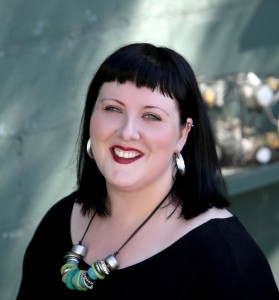 Note from Jenna: This guest post is from one of my screenwriting pals and a talented journalist, Nicola Pittam. I’ve come to know Nicola through my screenwriting training programs and love her clever wit and ability to churn out the writing at a moment’s notice (I’m pretty sure she wrote this post on the fly in under 20 minutes!).
Note from Jenna: This guest post is from one of my screenwriting pals and a talented journalist, Nicola Pittam. I’ve come to know Nicola through my screenwriting training programs and love her clever wit and ability to churn out the writing at a moment’s notice (I’m pretty sure she wrote this post on the fly in under 20 minutes!).
Nicola’s piece addresses not only HOW to write, but how to write more quickly. Take a look and see what you might glean from her experience for yourself. (And enjoy her British spelling!)
Ramp up your writing speed
by Nicola Pittam
When asked: “How do you write?” I invariably answer: “One word at a time.” (Stephen King)
That’s one of my favourite quotes about writing, from one of my favourite authors. You’d be surprised how many times a writer gets asked that same question over and over again. And while Mr. King’s answer might simply seem like common sense, it’s also completely true!
There is only one way to write – one word at a time, one word after another.
But sometimes it’s difficult to get that first word – or even 1000th word – down on the page, especially if you are on a deadline.
I’ve been a journalist for nearly 25 years and so I’m used to deadlines. In fact, I’ve become so used to it, I work better and quicker if I have a deadline looming in front of me.
But just like everyone else I procrastinate when it’s time to write. I’ll watch bad day time TV, make endless cups of tea, call family and friends to chat – anything but sit down in front of the computer. But if there’s a deadline and I know I have to deliver by a certain time, my brain kicks in and off I go.
I was working for Rupert Murdoch’s Sun newspaper in the UK at the age of 21, so I had to learn fast. If a breaking news story came into the newsroom at 6pm, it had to be written, subbed and in the paper by 6.30pm as the presses started to roll at 7pm for the next day’s paper. And if you couldn’t do that, you were out the door. So I learnt very early on to write fast and be precise. To this day I can write a breaking news story in 15 minutes, or churn out a 4,000 word magazine feature in under two hours.
For me it’s all about discipline and I was lucky enough to learn that on a job that I loved but that required it.
But what do you do when you don’t have that discipline? Or you’re not used to writing that fast but have all these ideas that want to come tumbling out?
I admit there are times I still have problems writing a script because at the end of the day I’m the only one accountable for it – there’s no editor waiting on the end of the phone to yell at me (or even fire me), if it’s not delivered on time.
So here are some ways I get around this:
- Set deadlines for yourself. They don’t have to big deadlines. Even little deadlines can help. Instead of thinking: “I HAVE to write 20 pages today”, set yourself smaller goals. You’re more likely to hit a deadline of 5 pages a day than 20. Then if you do more than 5 you’ll feel even more pleased with yourself.
- Try to have daily deadlines. This way you get into a flow. If you’re writing daily, it will become second nature, you’ll get into a rhythm and your writing will get quicker. A great screenwriting teacher, Hal Croasmun of ScreenwritingU, recently had a class doing assignments which were not something we’d generally do every day. But he told us: “This is your new normal.” And that’s what you’ve got to learn to do – make writing faster your new normal!
- Do as much pre-planning as possible before you even start writing. This will make it much easier (and quicker) to write if you have an idea what you are going to write. A lot of procrastination comes from not knowing what direction your story or script is going in. If you take the time to plot out your characters and story, the writing itself will flow much quicker.
- Reward yourself for meeting your deadlines. Give yourself a little treat if you meet your own deadline. It can be anything from taking an hour out of writing to watch your favourite show, buying a new book or indulging in a piece of pie or cake. My favourite is to get a neck and shoulder massage at the end of each week for spending so many hours sitting at a computer!
But just remember, hitting any deadline is a major accomplishment. At the end of the day, it doesn’t really matter how long it takes you to get there. We’d all love to write a script a week but don’t beat yourself up when that doesn’t happen. All that matters is that you do as the great Stephen King does, and that’s to write one word a time. And if you do that, before long you’ll have a completed script or novel that you’ll be proud of.

Nicola Pittam is an award winning author and former Fleet Street journalist. She has won awards for her news and features that have appeared in UK newspaper, The Sun, where she worked for 4 years, as well as several women’s real life magazines. She is the co-author of Christian Bale: The Inside Story of the Darkest Batman – a biography of the Oscar winning actor, which won four awards in 2013 including “Best Biography” at the Indie Book Awards and the National Indie Excellence Awards. She has been living and working in Los Angeles for the past 17 years as a journalist but now spends most of her time writing screenplays as well as working on a new non-fiction book and documentary, a YA trilogy and a TV pilot called House of the Rising Sun.
We’d love to hear your thoughts in the comments.
Warmly,

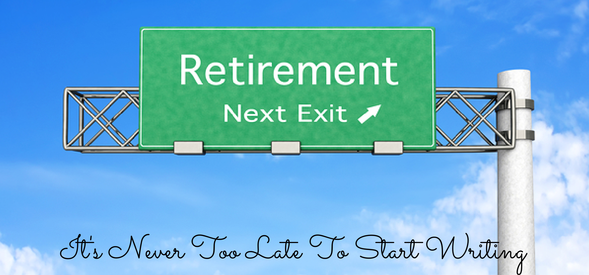
by Jenna | Jul 2, 2014 | Writing Articles
 Note from Jenna: This guest post is from one of our wonderful writing community members, Janis Brams.
Note from Jenna: This guest post is from one of our wonderful writing community members, Janis Brams.
Janis held a life-long dream of writing regularly and has made it happen now that she’s retired from her education career and her two daughters are grown.
One of the fascinating aspects about finally having the time to write when one retires is that having big blocks of time to write can actually be somewhat paralyzing. Janis uses the writing community and worked with my Design Your Writing Life course along with other online writing classes to create structure for her writing time.
Read on to find out more about what Janis learned to make writing while retired work for her.
Retired and Writing
by Janis Brams
Although I’ve wanted to be a writer since submitting a story about a girl and her dog to my eighth grade teacher, my writing record has been spotty. The piece ended with the girl’s dog jumping from a craggy cliff, and I was especially pleased with the final sentence “she ceased to exist,” written vertically down the page.
Unfortunately, for chunks of time, writing fiction and personal nonfiction ceased to exist for me.
While college, jobs, children, and graduate school challenged my attempts to maintain a consistent writing practice, fear played a role as well. What to write about and whether I’d have time to complete a piece were concerns that grew inside my head. They rooted there, fed by other doubts like was I talented enough to hold a reader’s interest and was I brazen to assume I had something to say worth reading.
My internal editor lived a splendid life.
But every once in awhile, I cajoled myself into pulling out a journal or sitting at a keyboard to record what I was thinking. I observed. I experienced. I felt.
And the need to sculpt words so that I could share what I was living continued to grow.
While I managed to produce some writing, the call to do more mushroomed so that even if I wasn’t writing, I was thinking that I should. I craved blocks of time to glue the bits and pieces of my stories into meaningful wholes, but my other passion, teaching children, was an exhausting task. Depleted by the end of day, I was too tired to do my writing justice. Instead, I dreamed about a time when my essays and my stories would assume their rightful place. And then, I retired.
The gift and terror of time to write
I woke up one morning with a huge chunk of time spread out before me. I could write for long hours, produce multitudes of end products; writing was my new priority. I was terrified.
Instead, I exercised, reached out to friends, organized bills, poured over cooking magazines, produced lovely dinners, and then went to bed promising myself that tomorrow would be the day I dedicated to writing.
I realized I was wasting precious time, so I spoke to my daughter, Rebecca, who is also a writer. Thinking I might enjoy an online class, she gave me a link to explore. I registered for a workshop and was hooked. The class held me to a deadline and provided me with a structure that felt familiar: a lecture, a prompt, a submission, and response to a critique. For 10 weeks, the duration of the class, I was a writing dervish. I overcame resistance and wrote, made deadlines, and revised.
I took one class and then another, but as each ended, my censor returned and resistance flourished. After spending hours assembling a cabinet to house unfinished stories, I realized an important piece was missing from my writing life.
The missing piece
I hadn’t thought to separate process from craft until an email appeared in my inbox with the subject line: “Mom, read this”.
Aware that I was floundering, last December my daughter sent me a link to a four-day class that Jenna was teaching, called Design Your Writing Life. The class was in the form of a conference call. “Why not drop in and see what you think?” Rebecca asked. [Note from Jenna: This class is now available as a homestudy course and will be on sale next week.]
Since then, I’ve subscribed to Jenna’s online writing community. The writing community has helped me see the importance of building a writing habit in addition to honing content. My biggest epiphany has to do with managing time. I understand the need to write consistently even if, some days, I can only manage minutes rather than hours. I give myself permission to accept these shorter blocks but feel compelled to intersperse them with longer stretches at the keyboard.
So while completing my progress page on the writing community website one night, I coined the term “Intervention Intention”. When too many days pass with little time for writing, I intervene, rearranging obligations so that composing rises to the top. My intention is to carve out the hours I need to pursue a passion and make a story happen.
My writing life isn’t perfect. I still worry my words are not precise enough or crafted well enough, but combining classes, focused on craft, with the writing community, focused on process, has given me a frame to hang my drywall. I sit at my keyboard and pound the stories out. Good or bad, I get to tell them. I’m retired and I’m writing, finally living out the dream from my childhood.

Janis Brams is a retired educator who formerly taught community college, middle school and elementary school for over 25 years in Pennsylvania, Upstate New York, and California. She now facilitates a small group of senior citizens writing memoirs as family legacies. She holds two graduate degrees, one in Education and one in Writing Composition. While she loves to teach writing, her fiercest passion has always been to write herself. She has published both fiction and personal essays in several small literary journals.

You may also be interested in:

by Jenna | Jun 25, 2014 | Writing Articles
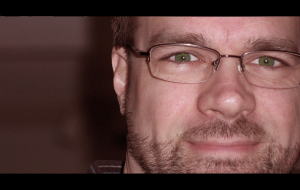 Note from Jenna: This guest post is from one of my favorite screenwriter pals, Tomm Gillies. Tomm is a writer, director, and lighting designer with a more than full-time business that keeps him on the road a LOT, and a family he loves spending time with. Finding time to write isn't always easy for him, but he makes it happen.
Note from Jenna: This guest post is from one of my favorite screenwriter pals, Tomm Gillies. Tomm is a writer, director, and lighting designer with a more than full-time business that keeps him on the road a LOT, and a family he loves spending time with. Finding time to write isn't always easy for him, but he makes it happen.
Take a look and see what you can learn from how he does it.
Making Writing Happen
by Tomm Gillies
Trying to kick-start a writing career when you already have a full-time day job or run your own business is like trying to run on two treadmills at the same time. As if that isn’t hard enough, the treadmills are probably running at different speeds. One (the full-time gig) may be chugging along nicely, whereas the writing treadmill is sputtering in fits and starts, or not moving at all.
So, how do you get that one going without allowing the other one to slow down too much or stop? And, perhaps more importantly, when can you transition from one to the other?
What happens when your writing career finally starts to blossom into a full-time gig?
When do you decide to leave the old day job for the new one, writing?
Like it or not, when writing becomes your career, it is your new day job.
Because, like it or not, when writing becomes your career, it is your new day job.
You still have to go to work. Every day.
But before you start to answer those questions, you need to write. And for that, you need time.
So, what’s the secret?
There isn’t one. At least it’s not a secret. All that stuff you’ve heard before? Turns out it’s mostly true.
But the one that rings truest? You have to love writing for it’s own sake.
You have to love the process, the craft, the assembling of letters into words, words into sentences, and sentences into paragraphs.
You have to love the idea that mere words can create an emotional response in someone you may never meet, the idea that mere words can inspire or destroy.
You have to love writing. You have to love writing. Oh, and one more thing: You have to love writing.
But you’re not reading this blog to hear that.
When you don't have time for writing
You already love writing. You want to write. You just feel as though you don’t have the time.
I’ll let you in on the real secret: You have the time. It’s there. You just need to locate it. And then you need to protect it. Protect it like Gollum protecting his “precious”.
As soon as you do that, you will discover more time for writing. You will start to suffer withdrawal when you haven’t written on a particular day or for a few days.
Sure, you’ll still have those moments when you stare at a blank page during your writing time with no words coming. That’s okay. Write about not being able to write.
Step away from the computer and grab a notebook or a journal. Write a To-Do List. Write a grocery list. Write a letter to your mother, your best friend from high school. Compose a Tweet - but not on Twitter. You do tweet, right? That’s writing.
Write something.
Don’t cheat the time just because you don’t know what to write in that particular moment. Even if you’re working on a particular story, novel, or script, if you’re stuck at that moment, write something else.
The point is to use your writing time to write. That’s what makes it a habit.
How I find time to write
I own my own successful business. We have two employees and I am one of them. I travel a lot -- 30,000+ miles a year and growing.
My best writing time? On the plane.
I’m stuck in a metal tube 30,000 feet in the air for 2+ hours. I put on my headphones, open up my laptop and start writing. In fact, I’m composing this post on a trip to Los Angeles.
Sometimes, I set up my laptop beforehand. I shut down any unnecessary programs. Where most people see travel delays as an inconvenience, I count it as more writing time.
It’s also helped me when I’m home. I create my own little airplane-like environment and write.
 For Father’s Day one year, my wife and kids got me a coffee mug that says “Go Away. I’m Writing.” They know when I’m using that mug it’s writing time.
For Father’s Day one year, my wife and kids got me a coffee mug that says “Go Away. I’m Writing.” They know when I’m using that mug it’s writing time.
But in order to get to that juncture, I had to overcome some obstacles. I had to be honest with myself, first. I spent some time answering these kinds of questions:
- How committed am I to making writing my career?
- How busy am I really? How much time do I spend doing “fake work” vs. “real work”?
- How much time do I currently spend on social media or other distracting websites?
- What are all of the things clamoring for my attention on a daily basis? (I made a list, and prioritized it into important, urgent, would be nice, distracting, unimportant.)
- How many time blocks (as little as 5 minutes) do I have during a day when I could be writing?
- And again, How committed am I to making writing my career?
Now it's your turn
Be brutally honest about how much time you spend not writing. Don’t beat yourself up, but be honest. Take your time. What are some things in your life that you see as obstacles that could be removed? Some are easy. Some only seem easy. Some are hard.
Rather than waiting for that “perfect” moment/place/inspiration/etc..., what can you do within your current situation to create time for writing?
In the end, I think you’ll be surprised how much time you do have.

Tomm Gillies is a screenwriter/director who writes on airplanes, in coffee shops, in hotel rooms, and occasionally at home. You can follow him on Twitter: @AbstractChicken

Thanks for reading!
We’d love to read your thoughts in the comments.
Warmly,



 This week I'm reading
This week I'm reading  During a lifetime of self-employment that included a four-year commitment as a volunteer executive in West Africa, Chris visited every country in the world (193 in total) before his 35th birthday. Since then he has modeled the proven definition of an entrepreneur: “Someone who will work 24 hours a day for themselves to avoid working one hour a day for someone else.”
During a lifetime of self-employment that included a four-year commitment as a volunteer executive in West Africa, Chris visited every country in the world (193 in total) before his 35th birthday. Since then he has modeled the proven definition of an entrepreneur: “Someone who will work 24 hours a day for themselves to avoid working one hour a day for someone else.”


 Note from Jenna: This guest post is from one of my screenwriting pals and a talented journalist, Nicola Pittam. I’ve come to know Nicola through my screenwriting training programs and love her clever wit and ability to churn out the writing at a moment’s notice (I’m pretty sure she wrote this post on the fly in under 20 minutes!).
Note from Jenna: This guest post is from one of my screenwriting pals and a talented journalist, Nicola Pittam. I’ve come to know Nicola through my screenwriting training programs and love her clever wit and ability to churn out the writing at a moment’s notice (I’m pretty sure she wrote this post on the fly in under 20 minutes!).
 Note from Jenna: This guest post is from one of our wonderful writing community members, Janis Brams.
Note from Jenna: This guest post is from one of our wonderful writing community members, Janis Brams.
 Note from Jenna: This guest post is from one of my favorite screenwriter pals, Tomm Gillies. Tomm is a writer, director, and lighting designer with a more than full-time business that keeps him on the road a LOT, and a family he loves spending time with. Finding time to write isn't always easy for him, but he makes it happen.
Note from Jenna: This guest post is from one of my favorite screenwriter pals, Tomm Gillies. Tomm is a writer, director, and lighting designer with a more than full-time business that keeps him on the road a LOT, and a family he loves spending time with. Finding time to write isn't always easy for him, but he makes it happen. For Father’s Day one year, my wife and kids got me a coffee mug that says “Go Away. I’m Writing.” They know when I’m using that mug it’s writing time.
For Father’s Day one year, my wife and kids got me a coffee mug that says “Go Away. I’m Writing.” They know when I’m using that mug it’s writing time.